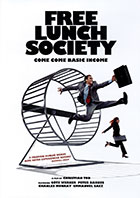
Free Lunch Society: Come Come Basic Income 2017
Distributed by Icarus Films, 32 Court St., 21st Floor, Brooklyn, NY 11201; 800-876-1710
Produced by Arash Riahi and Karin Berger
Directed by Christian Tod
DVD , color, 92 min.
College - General Adult
Activism, Capitalism, Documentaries, Economics, Finance, Future, Government, Political Science, Poverty, Social Movements, Social Problems, Sociology
Date Entered: 02/07/2018
Reviewed by Alan Witt, Business Librarian, SUNY GeneseoFree Lunch Society is a film with a strong political and social message. As the subtitle suggests, it is a polemic about the utility and benefits of universal basic income (UBI), and its intent is to squarely confront the common arguments against UBI. To that end, it starts by engaging with conservative positions, grounding its argument in the example of Alaska and moving to embrace libertarian rhetoric for UBI. From there, the film details actual experiments with UBI that occurred in Canada and the U.S., and spends a large portion of the run time debunking the concept that it would kill the population’s work ethic. It also addresses some of the liberal arguments against the concept, but the choice of rhetoric and primary thrust of the film is tailored towards convincing a conservative audience.
The documentary positions itself as a view from the future, beginning with a Jean Luc Picard quote (from Star Trek) about the human race having cast aside materialism, and moving on to talk about our present situation as a crucial point in the past of the disembodied voiceover ghost. The film bookends its argument with this framing, ending with uplifting music, NASA footage, and another voiceover from the future noting that this moment in time was the crossroads leading to the acceptance of UBI. This rather hopeful framing adds an optimistic air of eventual triumph to the film.
While the argument of Free Lunch Society is well constructed, the film itself suffers from some awkward production decisions. Each new interviewee is introduced through freeze frames with an explanatory voiceover, an unfortunate visual choice with the effect of capturing the subjects in suboptimal poses including one gaping mouth. Chapters begin with the same musical beat, a marker that feels increasingly heavy handed as the documentary progresses. Apart from these elements, the film is well produced, with a good mixture of interviews, “daily life” shots, historical clips, and segments from popular media. The pacing is well done, moving along at the right clip to keep viewer interest alive and not belaboring their points. Despite the occasional awkwardness, this reinforces the film’s central argument and makes for a compelling viewing experience.
Free Lunch Society carries a heavy price point, but that price brings with it public performance rights that make this an excellent opportunity for a campus or school wide conversation. Each chapter of the film takes up a different aspect of the argument, allowing for shorter chunks to be shown without sacrificing overall meaning. As with any polemic, this film is an excellent target for analysis and critique, and is entertaining and relevant enough to be watchable for its own sake; it would be an excellent addition to any college or public library collection.